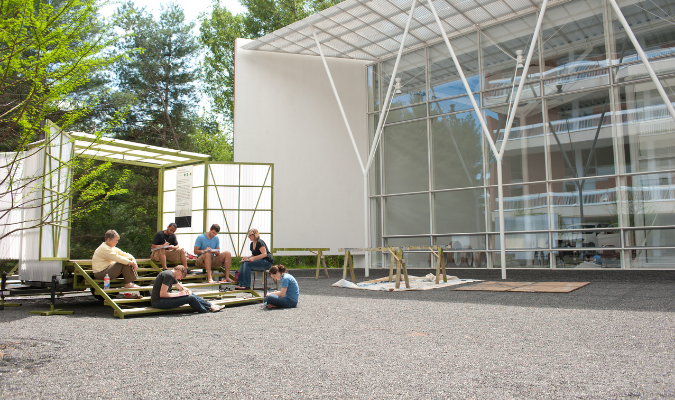
In-Person Open House
The in-person open house will take place on Friday, October 31st, at 12:30 p.m. - 3:00 p.m.

Accredited by the National Architectural Accrediting Board (NAAB), the Master of Architecture (M. Arch.) is the professional degree required by most state registration boards as a condition of licensure for architectural practice. At Clemson, the M. Arch. program seeks to develop students’ proficiency in responding to contemporary architectural, social, and global issues with a balance of theoretical knowledge and practical abilities. As the only school of architecture in the state, Clemson Architecture gravitates toward the middle of the theory-practice spectrum, offering an educational foundation that respects both the theoretical, conceptual, and historical knowledge needed by educated leaders with the skills needed in the contemporary architectural practice. Each semester, major emphasis is placed on the work of the design studio, where design solutions—architectural, environmental, conceptual, or constructed, as appropriate—are proposed for a broad range of local needs and global issues. The design studio is complemented by coursework in building technology, architectural history and theory, representation and fabrication, research methods, and professional practice topics, and these courses are integrated with studio whenever possible.
Application Information

The in-person open house will take place on Friday, October 31st, at 12:30 p.m. - 3:00 p.m.


The virtual open house will be held on Tuesday, October 7th, at 9:00 a.m. - 10:30 a.m.
Clemson offers four tracks toward earning the professional, NAAB-accredited (NAAB accreditation) Master of Architecture (M. Arch.) degree:
Within the framework of the accredited and highly structured M. Arch. degree program, Clemson Architecture seeks to offer students as much choice as possible. Some students seek to focus their studies in the highly respected Architecture + Health program. Others focus their interests in the Architecture + CommunityBUILD program or Digital Ecologies certificate program. Some spend one or two semesters in Charleston, Barcelona, or Genoa. Others pursue up to 12 credit hours of elective coursework (nearly one semester) outside of architecture.
As seen in the Master of Architecture Plan of Study, the M. Arch. curriculum is described as a three-year curriculum with 6 semesters of coursework. The semesters are numbered 1 through 6 and described as Semester 1, Semester 2, etc. Three-Year, M. Arch. I students begin in First Year, Semester 1; Two-Year M. Arch. II students receive advance placement for their pre-professional studies and begin in Semester 3.
All three-year M. Arch. I students take the same coursework in the First Year. After the First Year, students may begin to specialize their studies. Students admitted to the Architecture + Health program move into the A+H studios and concentrate on A+H coursework. All other M. Arch. students have 12 credit hours (4 courses) of open electives in any graduate level subject, may pursue certificate programs, and have greater flexibility for up to two semesters of off-campus study in Charleston, South Carolina; Barcelona; and/or Genova, which together comprise Clemson's Fluid Campus.
Download a printable version here.
FIRST YEAR: CORE STUDIOS
Three-Year (M. Arch. I) Track (90 Credits) begins here
|
Semester 1 | FALL | Clemson Campus 6 ARCH 8410 Architecture Studio I 3 ARCH 8100 Visualization I 3 ARCH 8600 Architectural History and Theory I 3 ARCH 8700 Structures I 15 credits |
Semester 2 | SPRING | Clemson Campus 6 ARCH 8420 Architectural Studio II 3 ARCH 8200 Visualization II 3 ARCH 8610 Architectural History and Theory II 3 ARCH 8710 Structures II 15 credits |
SECOND YEAR: INTERMEDIATE STUDIOS
Two-Year (M. Arch. II) Track (60 Credits) begins here
|
Semester 3 | FALL | Clemson Campus 6 ARCH 8510 Design Studio III 3 ARCH 8210 Research Methods 3 ARCH 8720 Productions and Performance + 8721 Lab 3 ARCH 8730 Environmental Systems + 8731 Lab 15 credits |
Semester 4 | SPRING | FLUID CAMPUS 6 ARCH 8520 Design Studio IV 3 ARCH 8710 Structures II (or GRAD XXXX Elective) 3 GRAD XXXX ELECTIVE 3 GRAD XXXX ELECTIVE 15 credits |
THIRD YEAR: ADVANCED STUDIOS
|
Semester 5 | FALL |FLUID CAMPUS 6 ARCH 8570 Design Studio V 3 GRAD XXXX ELECTIVE 3 GRAD XXXX ELECTIVE 3 GRAD XXXX ELECTIVE 15 credits |
Semester 6 | SPRING | Clemson Campus 6 ARCH 8920 Comprehensive Studio (Studio VI) 3 ARCH 8640 Architectural History and Theory 3 ARCH 8740 Building Processes: Technical Resolution + 8741 Lab 3 ARCH 8820 Building Economics, Costs and Legal Issues 15 credits |
|
CERTIFICATE PROGRAMS (Semester 4/5): Programs offered at Clemson Campus are:
Programs offered at Charleston Campus are:
FLUID CAMPUS OPTIONS
|
|
Architecture + communityBUILD
Architecture + communityBUILD is an application-based,18-credit hour certificate program focused on community engagement and a holistic approach to design-build.
Digital Ecologies
Digital Ecologies is a 15-credit hour certificate program focused on leveraging technology with computational design thinking to make a positive impact.
Certificate in Architecture, Society and the City
Architecture, Society and the City is a 12-credit hour certificate program focused on the ideas, histories and theories behind buildings.
Resilient Urban Design Certificate
Resilient Urban Design is a 15-credit hour certificate program that addresses design and development thinking relative to stewarding change in rapidly growing metropolitan regions.
This is a STEM designated program: CIP code 04.0902 (architectural and building sciences/technology)
CIP Code 04.0902 (architectural and building sciences/technology)
Employment versus Financial Aid
The Richard A. McMahan School of Architecture does not offer financial aid. For financial aid, see the University's Financial Aid webpage. The Richard A. McMahan School of Architecture offers employment in the form of assistantships and hourly positions. The School offers a limited number of assistantships to new M. Arch. II students based on the strength of their applications and their standing in the applicant pool; however, these students must still apply for placement to determine their best assistantship role among available positions. (The School also offers a limited number of recruiting fellowships sponsored by the state chapters of the AIA and other benefactors.) The number of assistantships available is limited by the School of Architecture's budget in a given year; fellowships are limited by the amount and timing of funds; hourly positions depend on the budget and School employment needs. No assistantships or fellowships extend beyond the number of semesters offered in the official award letter; all are limited in time and none renew automatically.
Graduate Assistantships
Assistantships are employment where a full-time graduate student serves the School of Architecture as a graduate teaching assistant (GTA), graduate research assistant (GRA), or graduate administrative assistant (GAA) in return for a paycheck and tuition credit. See the Graduate School's Graduate School's Student Employment/Graduate Assistantships webpage.
Application Process and Timing
Assistantships are for one year and follow the academic calendar. Applications are requested one time per year, during the late spring or early summer—probably in May—before the start of the next academic year. At this time, a call for applications is sent by email to all registered graduate students with a list of available positions. Under normal circumstances, no positions will be offered or available after positions are awarded until the next call for applications, in the next summer, in advance of the next academic year.
Qualifications
Full-time graduate students (i.e., minimum enrollment of 9 credit hours) in good academic standing (i.e., GPA 3.0 and above) are eligible for consideration. For School of Architecture assistantships, the primary considerations for appointment are 1) academic performance for continuing students or applicant ranking for new students, and 2) fitness, experience, or other qualifications for the employment role.
Employment Period
The employment period is August 15 to May 15. Graduate Assistants work on the same schedule as faculty, including term breaks (but not official holidays). See the Graduate Assistantships, Holiday Leave policy.
Payroll Paperwork
Assistants must complete employment paperwork on campus and no later than August 15. Please see or contact Michelle McLane, Student Services Coordinator, for more information.
Responsibilities
Graduate assistants (GAs) serve faculty and the School of Architecture as teaching, research, and administrative assistants. GAs in architecture are required to work an average of 10 hours per week, for a total of 200 hours per semester. Given the required 15-credit hour workload in the Master of Architecture program, M. Arch. students are limited to a "1/4 time" assistantship, with maximum of 10 hours per week. See the Enrollment Limits policy and chart and the Maximum Work Hours policy. Assistants cannot be scheduled for more than 10 hours per week, but must account for 200 hours of work per semester. Assistants must keep a current timesheet and work log, and must be prepared to give a copy of this to their primary supervisor, student services coordinator, or department head upon request. Also see the "Aspire" program requirement below.
"Aspire for Graduate Students" Training
All graduate assistants are required to complete an "Aspire for Graduate Students" session. "Aspire for Graduate Students" is a comprehensive program that provides a dialogue-based educational session focusing on sexual violence prevention in adherence with Title IX guidelines, alcohol and other drug misuse, mental health, and campus resources. Graduate students will learn about beneficial personal health resources and also how to respond to and seek professional help for their peers and the undergraduates with whom they work. The program is administered by the Student Health Services, Division of Student Affairs, Healthy Campus initiative.
Off-Campus Assistantships
Assistantships are employment related to the needs of the School, its programs, and its faculty. The Clemson campus, since it is the hub of School activities and has more students in residence, has more employment needs than our smaller off-campus centers. It is therefore our policy to limit assistantships to no more than two students at our off-campus centers. Because assistantships may not be deferred, if there are more than three students awarded assistantships who are slated to study at the same off-campus center, it may be the case that someone (based on rankings and other considerations) awarded an assistantship will be asked to defer their off-campus study to another semester or forfeit their assistantship for that semester.
International Students
International students must have a high level of English language ability to qualify for most assistantships; teaching, administrative, and research assistants all need a high level of English language proficiency. International students employed in labs must also have the requisite skills. See the International Student Employment, Graduate Assistantship policy.
Tuition/Fees
Students with assistantships pay fees but no tuition. See the Graduate School Tuition & Fees webpage.
Renumeration
Graduate assistants are paid. The pay is sometimes referred to as a "stipend." See the Graduate School's Student Employment/Graduate Assistantships webpage.
Renewal
Assistantships are for one year only and do not automatically renew. Even if your financial aid account shows an assistantship as continuing, this is due to a lag in the accounting process—assistantships do not automatically renew. However, all registered graduate students may apply for an assistantship in the annual call for applications, and the applications of students previously awarded an assistantship who have performed their duties well will be considered.
Termination
Assistants may be terminated for not carrying out assistantship responsibilities, including not working the required 10 hours per week, and will be required to pay the balance of remitted tuition. See the Graduate Assistants, Termination for Cause policy. Assistants are required to maintain good academic standing; students on academic probation (i.e., with a GPA below 3.0) will not be eligible for an assistantship, and GAs placed on academic probation after the fall semester will lose their assistantship for the spring semester. See the Termination for Academic Deficiency policy.
Graduate School Policies
For all Graduate School policies related to assistantships, see the Graduate School's Financial Policies webpage.
Hourly Employment
For some needs and special projects, the School will employ students on an hourly basis. Hourly employees are limited to 10 hours per week in accordance with the Enrollment Limits policy and chart and the Maximum Work Hours policy.
Graduate School Policies
The following Graduate School policies apply to hourly employment:
Clemson’s IPAL program
INTEGRATED PATH to ARCHITECTURAL LICENSURE (IPAL) - provides an opportunity to fulfill the requirements for architectural licensure while completing the architectural degree. Clemson University’s Richard A. McMahan School of Architecture has been selected by NCARB as one of the accredited programs to participate in this initiative, and has developed a rigorous curriculum track that integrates the academic and experience components essential to architectural licensure. Architecture students selected for the program during their second year of undergraduate study will embark on a 4 ½ year track that integrates the academic components of architectural study with the internship and examination components of architectural practice. Two semesters of undergraduate study and two semesters of graduate study will take place at the Clemson Architecture Center in Charleston (CAC.C), and summer internships will be necessary to fulfill requirements.
Architectural Experience Program™ (AXP™)
The Architectural Experience Program™ (AXP™) provides a framework to guide you through gaining and recording your professional experience. Developed by NCARB, the program is required by most U.S. jurisdictions and is a key step on the path to earning a license.
Architect Registration Examination® (ARE®)
As developed by NCARB, the ARE® assesses a candidate's knowledge, skills, and abilities to provide the various services required in the practice of architecture. It has been adopted for use by all U.S. registration boards and the Canadian provincial architectural associations as the registration examination for all candidates seeking architectural licensing. NCARB tracks the pass rates for the ARE® in two ways - one by division and the other by NAAB-accredited schools of architecture.
“I chose the M.Arch program because of the professors. I was able to work with a few of them during undergrad and knew I wanted the chance to continue to learn from them. They take the time to get to know me and are invested in my success. They also support me beyond academia. I am the president of GAPP and the graduate advisor of cNOMAS. Both of these organizations allow me to build community with others in the Richard A. McMahan School of Architecture. The connections with the faculty and my peers are what the Clemson experience is all about. ”
Michael UruetaM. Arch '23Richard A. McMahan School of Architecture
Co-Director of Graduate Architecture
Email: dlee2@clemson.edu | Office: Lee 3-102
About Dave Lee

Co-Director of Graduate Architecture
Email: amihala@clemson.edu |Office: Lee 2-313
About Andreea Mihalache